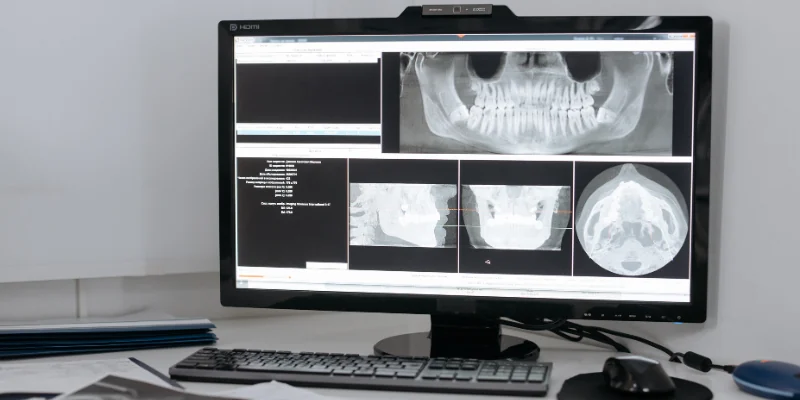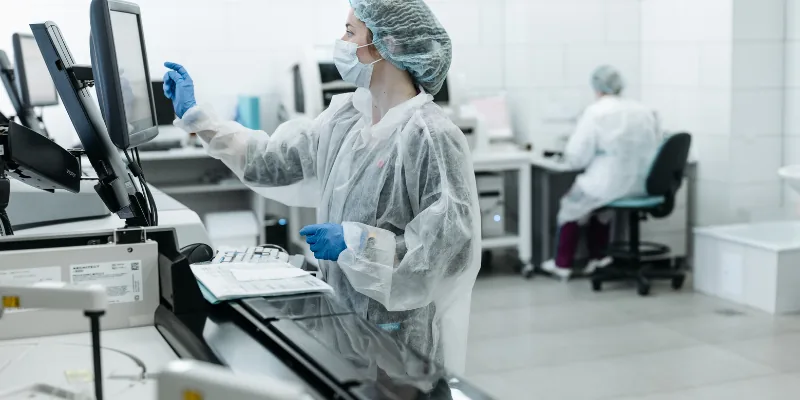Uses of Computer in Healthcare for Better Treatment
Published: 19 Feb 2025
Did you know that over 90% of healthcare providers in the U.S. now use electronic health records (EHRs)? Computers are revolutionizing healthcare by improving patient care, increasing efficiency, and supporting medical professionals with accurate diagnoses. The advantages of computers in healthcare are vast, from enhancing treatment options to reducing administrative burdens. The uses of computer in healthcare are discussed below:
Improved Patient Care
Computers help healthcare professionals provide better care by giving quick access to patient information and medical histories. This allows doctors to make informed decisions faster, leading to better treatment. With digital records, doctors can easily check past treatments and medications, monitor patients over time, and respond quickly in emergencies. Real-time access to data also helps doctors collaborate with other healthcare providers, reducing miscommunication and improving overall care. Patients benefit from more personalized treatment based on their health data, as well as fewer delays due to missing information.
Digital tools help healthcare providers track patterns in patient health, making it easier to spot issues early. Follow-up care also improves with digital reminders and alerts, ensuring patients receive the attention they need. By using computers, medical professionals can provide faster, safer, and more accurate care. This leads to better health outcomes and a clearer understanding of each patient’s overall well-being.

Faster Diagnoses
Computers can process large amounts of medical data quickly, helping doctors make faster and more accurate diagnoses. With advanced technology, healthcare providers can detect diseases earlier and choose the best treatment options. AI tools support doctors by analyzing medical data and offering helpful suggestions, leading to better decision-making. Medical imaging software also plays a key role in detecting conditions early by quickly analyzing X-rays, MRIs, and other scans. This allows doctors to compare medical data efficiently and spot issues sooner.
Faster diagnoses mean patients can receive treatment quickly, improving their chances of recovery. AI and machine learning help identify patterns that doctors might miss, reducing the risk of misdiagnosis. Advanced diagnostic tools also minimize the need for invasive tests, making healthcare more comfortable for patients. By tracking disease progression over time, computers provide a clearer picture of a patient’s health. Overall, these technologies lead to safer, more effective medical care.

Easy Access to Medical History
Electronic Health Records (EHRs) allow healthcare providers to instantly access a patient’s medical history, including past treatments, medications, and test results. This reduces the need for paperwork and physical storage, making healthcare more organized and efficient. With all medical history stored digitally, there is less risk of losing important records, ensuring that doctors have accurate information when making decisions. EHRs help doctors understand a patient’s past conditions and treatments, leading to better care.
EHRs can be securely shared between healthcare providers, improving coordination and preventing duplicate tests or unnecessary procedures. Patients also benefit because they don’t have to repeat their medical history at every visit, saving time for both them and their doctors. These digital records reduce administrative work, allowing doctors to focus more on patient care. By tracking ongoing treatments and keeping records up to date, EHRs increase patient safety and make healthcare more effective and reliable.
Better Communication
Computers make communication among healthcare providers seamless, allowing doctors, nurses, and specialists to share patient information in real time. This ensures coordinated care, reducing mistakes and enabling quicker decision-making for better treatment outcomes. Secure digital systems allow doctors to instantly communicate with each other, making it easier to consult specialists without delays. Healthcare teams can quickly share updates on a patient’s condition, ensuring that everyone involved stays informed.
By providing a platform for collaboration and case discussions, computers help reduce miscommunication between different departments. Important information is transferred faster, minimizing treatment delays and improving patient care. Digital communication also eliminates the need for paper records, making the process more efficient. When all healthcare professionals have access to the same treatment plans and updates, teamwork improves, leading to better results for patients. Overall, computers enhance collaboration, ensuring that medical professionals work together effectively to provide high-quality care.

Telemedicine
Telemedicine allows patients to consult with doctors remotely through video or phone calls, saving time and effort. This is especially helpful for people in rural areas who may not have easy access to healthcare facilities. It also benefits those with limited mobility or individuals who prefer to avoid travel for minor health concerns. With telemedicine, routine check-ups and follow-up visits can be done from the comfort of home, reducing the need for in-person appointments.
This approach saves both patients and healthcare providers time and travel costs while also reducing the burden on hospitals and clinics. It offers more flexible appointment times, making healthcare more accessible. People with disabilities or mobility challenges can receive medical care without difficulties. Telemedicine also supports mental health by providing virtual therapy sessions. Overall, it increases convenience, reduces wait times, and ensures that more people receive the care they need without unnecessary delays.
Appointment Management
Computers help healthcare providers manage patient appointments and schedules more efficiently. Digital systems allow patients to book, cancel, or reschedule appointments online, reducing errors and making the process more convenient. This helps healthcare facilities run smoothly while saving time for both patients and staff. By automating scheduling, healthcare providers can avoid double-booking or missed appointments, ensuring better organization.
Patients receive reminders about upcoming appointments, reducing the chances of forgetting them. Rescheduling or canceling appointments is easier, as it can be done online without needing to call the clinic. This system also helps doctors focus more on patient care instead of administrative tasks. By preventing overbooking, clinics can run on time, reducing waiting periods for patients. Overall, digital appointment management improves efficiency, provides a hassle-free experience, and ensures that healthcare facilities operate in a well-organized manner, benefiting both medical professionals and patients alike.
Reduced Human Error
Using computers in healthcare helps reduce the risk of human error, especially in medication administration and treatment planning. Digital systems can double-check prescriptions and dosages, ensuring accuracy and preventing mistakes. This leads to safer and more reliable healthcare for patients. Computers assist doctors and nurses by verifying medication doses and flagging potential errors in prescriptions, ensuring that patients receive the correct treatment every time.
Electronic health records track patient data more accurately than paper records, reducing mix-ups in medications and treatment plans. Computers can also alert healthcare providers to potential issues with treatments, helping to prevent complications. By minimizing administrative errors and reducing the need for manual paperwork, digital systems make healthcare processes more efficient and accurate. This second layer of verification supports better medical decisions, leading to improved patient safety and outcomes. Overall, using computers in healthcare ensures a higher level of accuracy, reducing risks and enhancing patient care.

Streamlined Administration
Computers make administrative tasks like billing and insurance claims much easier and faster. Automated systems reduce paperwork and errors, leading to quicker payments and fewer misunderstandings. This helps healthcare facilities run more efficiently. With digital billing, invoices are processed faster, and patients receive more accurate statements, reducing confusion. Insurance claims can be submitted electronically, speeding up approvals and payments.
By reducing the need for manual data entry, computers minimize human errors and lower administrative costs. Healthcare facilities save time by automating repetitive tasks, allowing staff to focus on more important duties. Automated checks also help catch billing errors before they cause issues. Faster processing means healthcare providers get paid on time, improving cash flow and financial stability. Patients also benefit from clearer and more detailed billing statements. Overall, using computers in healthcare administration makes the entire process smoother, more accurate, and more efficient for everyone involved.
Personalized Treatment
Computers can analyze a patient’s health data to create a personalized treatment plan, helping doctors customize care based on factors like genetics, lifestyle, and medical history. This tailored approach leads to more effective treatments and better health outcomes. By considering personal factors, doctors can choose the best treatment options, reducing side effects and complications. Personalized care ensures that patients receive the most suitable medications and therapies for their specific needs.
Computers also help determine the optimal dosage for each patient through data analysis, reducing the trial-and-error approach in treatment. This improves the chances of positive outcomes and helps doctors make more informed decisions. Additionally, computers can monitor the effectiveness of treatments in real time, allowing adjustments when necessary. As a result, patients receive safer, more precise care. Personalized treatment not only enhances health but also increases patient satisfaction and trust in the healthcare system, leading to a better overall experience.

Faster Lab Results
With the help of computers, lab results can be processed and delivered much faster than traditional methods. This allows doctors to quickly review results and make informed treatment decisions. The faster the results, the sooner patients can begin the right care. Lab results are automatically uploaded to digital systems, ensuring that doctors receive them in real time without delays. This reduces waiting times for patients and minimizes the risk of lost or misplaced results.
Immediate access to lab data allows doctors to adjust treatment plans faster, improving patient outcomes. Digital systems also reduce manual errors in handling lab information, making the process more accurate and reliable. Faster processing helps with early disease detection, increasing the chances of successful treatment. In urgent health conditions, quick results enable doctors to respond promptly. Patients also benefit from reduced stress and anxiety while waiting for their test results, making the healthcare experience smoother and more reassuring.
Computers help doctors access patient records instantly, leading to faster and more accurate diagnoses. They also make it easier for healthcare providers to track treatments and manage appointments. This means better overall care for patients.
EHRs are digital versions of a patient’s paper records. They allow healthcare providers to quickly access important health information like allergies, medications, and medical history. This improves communication and reduces errors
Telemedicine uses computers and the internet to offer remote consultations with doctors. Patients can have video calls or send health data, making it easier to access care without leaving home. It’s especially helpful for minor conditions or follow-up visits.
Yes! Computers use powerful software to analyze medical data and images, such as X-rays or MRIs, to identify diseases. They can spot patterns that humans might miss, leading to faster and more accurate diagnoses.
Artificial Intelligence (AI) helps computers learn from data and make decisions. In healthcare, AI can assist in diagnosing diseases, predicting patient outcomes, and suggesting treatments. It improves both the speed and accuracy of healthcare services.
Yes, computers use strong security measures like encryption to keep medical information safe. Healthcare providers follow strict privacy laws to protect patient data. However, it’s important to always make sure your healthcare provider uses secure systems.
Computers automate the billing process, making it quicker and more accurate. They can calculate costs, manage insurance claims, and send electronic invoices. This reduces errors and helps healthcare providers get paid faster.
Computers reduce the need for paper records and manual tasks, cutting down on operational costs. They also improve efficiency, meaning doctors and nurses spend more time with patients instead of handling paperwork. This helps save money in the long run.
No, computers are tools that support doctors, but they cannot replace human expertise. They assist with tasks like diagnosing and planning treatments, but a doctor is still needed for making final decisions and providing care.
As a patient, you can benefit from faster appointments, easier access to your medical records, and more accurate diagnoses. You may also be able to use telemedicine for quick consultations or track your health data through apps, making it easier to stay healthy.
Conclusion
So guys, in this article, we’ve covered the advantages of computers in healthcare in detail. With the growing role of technology in healthcare, there’s never been a better time to leverage these tools for better care and faster services. I highly recommend exploring how digital tools can improve your healthcare experience, whether by using telemedicine or tracking your health through apps. Ready to experience the benefits? Start exploring today and see how computers can improve your healthcare journey!

- Be Respectful
- Stay Relevant
- Stay Positive
- True Feedback
- Encourage Discussion
- Avoid Spamming
- No Fake News
- Don't Copy-Paste
- No Personal Attacks

- Be Respectful
- Stay Relevant
- Stay Positive
- True Feedback
- Encourage Discussion
- Avoid Spamming
- No Fake News
- Don't Copy-Paste
- No Personal Attacks
